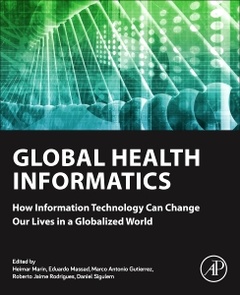Global Health Informatics How Information Technology Can Change Our Lives in a Globalized World
Coordonnateurs : Marin Heimar, Massad Eduardo, Gutierrez Marco Antonio, Rodrigues Roberto Jaime, Sigulem Daniel

Global Health Informatics: How Information Technology Can Change Our Lives in a Globalized World discusses the critical role of information and communication technologies in health practice, health systems management and research in increasingly interconnected societies. In a global interconnected world the old standalone institutional information systems have proved to be inadequate for patient-centered care provided by multiple providers, for the early detection and response to emerging and re-emerging diseases, and to guide population-oriented public health interventions. The book reviews pertinent aspects and successful current experiences related to standards for health information systems; digital systems as a support for decision making, diagnosis and therapy; professional and client education and training; health systems operation; and intergovernmental collaboration.
1. Global Health Informatics—An Overview2. National Health Information Systems and Health Observatories3. Information and Communication Technologies and Global Health Challenges4. Standards for Global Health Information Systems5. Data Systems and Global Health Informatics Research6. Clinical Information Systems7. The New Medicine: From the Paper Medical Record to the Digitized Human Being8. Telemedicine, eHealth and Remote Care Systems9. Analytics and Decision Support Systems in Global Health Informatics10. Patient Engagement and Digital Health Communities11. Ethical and Transborder Issues12. Intergovernmental Collaboration in Global Health Informatics
Eduardo Massad is Fellow of the Institute of Mathematics and its Applications, Chartered Mathematician (IMA-UK), Chartered Scientist (SciCoun-UK), and Fellow of the Royal Society of Medicine. He has almost 40 years of experience in applying mathematical methods to medical problems and is co-editor of the Elsevier’s book Global Health Informatics: How Information Technology Can Change Our Lives in a Globalized World.
Marco Antonio Gutierrez is an Electronic engineer (1985), with specialization in Electronic Computation by Mathematical and Statistical Sciences, Institute of São Carlos, USP (1985), Ph.D. in electrical engineering from Polytechnic School, USP (1995) and Associate Professor in Health Informatics, Federal University of São Paulo (2008). Currently he is Director of the Department of Computer Science, Heart Institute, USP. Collaborating Researcher on 27 research projects and technological innovation, financed by Brazilian governmental funding agencies (FAPESP). Member of the Brazilian Society of Biomedical Engineering (SBEB) and of the Brazilian Society of Health Informatics (SBIS), entity in which served as Vice President (2008-2010), Treasurer (2010-2012) and Chairman (2012-2014).
Roberto Jaime Rodrigues is Consultant, eHealthStrategies, Bethesda MD, USA and Global Health International Advisors, Washington DC, USA; Medical Degree (1964), University of São Paulo School of Medicine, São Paulo, Brazil; Specialization in Surgery (1973), Beth Israel Medical Center, City University of New York, New York; Visiting Researcher (1975), Medical Informatics Department, Karolinska Hospital, Stockholm; Director (1975-1990), Technical Supporting Servic
- Discusses how standalone systems can compromise health care in globalized world
- Provides information on how information and communication technologies (ICT) can support diagnose, treatment, and prevention of emerging and re-emerging diseases
- Presents case studies about integrated information and how and why to share data can facilitate governance and strategies to improve life conditions
Date de parution : 12-2016
Ouvrage de 312 p.
19x23.3 cm



